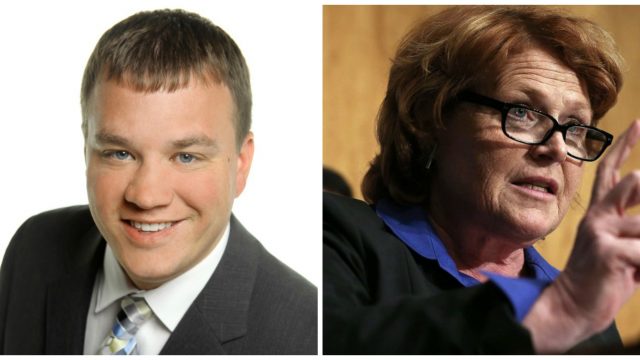When The Policy Is Good, The Motivations Are Irrelevant

The Grand Forks Herald today takes aim at HB1181, introduced by Rep. Roscoe Streyle (R-Minot), which was the subject of a heated hearing before the House Government and Veterans Affairs Committee earlier this week.
“Streyle’s wrong about the “very simple” reason he ascribes — namely, his and his party’s supposedly deep desire to let North Dakota voters and only North Dakota voters choose a replacement U.S. senator,” writes opinion editor Tom Dennis on behalf of the Herald. “Instead, the real reason behind the proposed change is naked, partisan politics.”
[mks_pullquote align=”right” width=”300″ size=”24″ bg_color=”#000000″ txt_color=”#ffffff”]What’s far more important here than motivations and finger-pointing is whether or not the policy itself proposed by Rep. Streyle is sound.[/mks_pullquote]
The Herald, of course, is referring to the idea that this legislation is aimed at discouraging U.S. Senator Heidi Heitkamp from leaving her Senate term early and running for Governor in 2016.
It’s not for me to ascribe motivations to Rep. Streyle or anyone else supporting the bill (it got a “do pass” recommendation from the committee), but even if the motivation is the purest of partisan politics, so what?
What does motivation matter if the policy is good?
Dennis has long seem more concerned about who supports a given policy rather than what that policy is. He is a staunch member of the cult of bipartisanship, which holds that the only good policy is policy that is bipartisan. Regardless of what that policy is, it seems.
Now, if we want to play Dennis’ game we can. What of the motivations of Democrats in opposing this legislation? It’s clear that Senator Heitkamp is at least thinking of running in 2016, and Democrats want a twofer if she does run and win. They’d like to see Heitkamp in the governor’s chair, and the additional prize of having one of their own elevated into the U.S. Senate.
That also seems partisan to me, and so what? It may be a little mercenary, but in a similar circumstance Republicans would probably be taking the same position.
What’s far more important here than motivations and finger-pointing is whether or not the policy itself proposed by Rep. Streyle is sound.
The bill would simply require that all vacancies occurring in the U.S. Senate seat be filled by special election, unless the vacancy should occur within 95 days of the next general election in which case the position would be filled by that election.
Dennis gripes that this change could possibly leave one of the state’s Senate seats empty for a few months, which might be a valid argument if that wasn’t already how we fill vacancies in the U.S. House. Current law requires a special election for U.S. House vacancies, and could result in a vacancy lasting for a couple of months depending on the circumstances.
“By any measure, a state loses out when it can cast only one vote in the U.S. Senate,” writes Dennis. Ok, but how about having no votes in the U.S. House should a vacancy occur for our at-large seat?
It’s not a good thing, to be sure, which is part of the reason why Heitkamp will probably face some blowback from voters for not finishing her Senate term should she choose to run for Governor. But these vacancies occur rarely. When they do, isn’t the best path forward – the one least fraught with partisan maneuvering even outright corruption – a special election allowing the people to fill the vacancy?
Of course it is.
UPDATE: Originally this post referenced Streyle’s legislation as exempting special elections for vacancies occurring 60 days from the general election. I was mistaken about the bill’s amendment. The period is now 95 days. I’ve corrected the post to reflect that.




